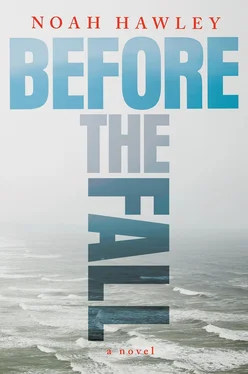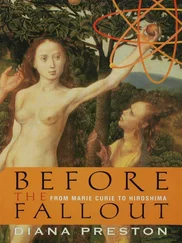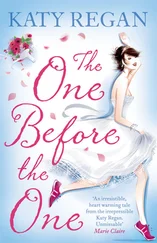“Mr. Burroughs.”
Scott stops, his hand on the taxi door.
“We really don’t want to bother you today,” says Gus.
“It’s not called bothering ,” says O’Brien. “It’s called our job .”
Scott shrugs, no way around it.
“Get in,” says Scott. “I don’t want to do this on camera.”
The cab is a minivan. Scott rolls the door back, climbs inside, and sits on the back bench seat. The agents look at each other, then climb in also. Gus in front, O’Brien and Hex in the middle jump seats.
“Thank you,” says Scott. “I’ve lived this long without being captured by helicopter camera—”
“Yeah, we noticed,” says O’Brien. “You’re not a big fan of social media.”
“Any media,” says Hex.
“How’s the search going?” Scott asks Gus.
Gus turns to the driver, a Senegalese man.
“Can you give us a minute?”
“It’s my cab.”
Gus takes out his wallet, gives the man twenty dollars, then another twenty when that doesn’t work. The driver takes it, climbs out.
“Hurricane Margaret is moving north from the Caymans,” Gus tells Scott. “We’ve had to call off the search for now.”
Scott closes his eyes. Maggie, Margaret.
“Yeah,” says Gus. “It’s a bad joke, but they name these things at the beginning of the season.”
“You seem pretty upset,” says O’Brien.
Scott squints at the agent.
“A woman died in a plane crash and now there’s a hurricane named after her,” he says. “I’m not sure how I’m supposed to seem.”
“What was your relationship with Mrs. Bateman?” asks Hex.
“You guys have a way of saying words that’s very judgmental.”
“Do we?” says O’Brien. “It probably comes from a deep-seated philosophical belief that everybody lies.”
“I might give up on conversation entirely, if I thought that,” says Scott.
“Oh no. Makes it fun,” says O’Brien.
“People are dead,” Gus snaps. “This isn’t a game.”
“With respect,” says O’Brien, “ you focus on what made the plane go down. We’ll zero in on the human factor.”
“Unless,” says Hex, “the two things are actually the same.”
Scott sits back and closes his eyes. They appear to be having this conversation without him now and he feels weary. The ache in his shoulder has subsided, but there is a headache creeping up the rim of his brain, a deep-tissue echo of the swelling barometric pressure outside.
“I think he fell asleep,” says Hex, studying him.
“You know who sleeps in a police station?” says O’Brien.
“The guy who did it,” says Hex.
“You boys should get your own radio station,” says Gus. “Morning sports. Traffic and weather together on the eights.”
O’Brien taps Scott’s chest.
“We’re thinking of getting a warrant to look at your paintings.”
Scott opens his eyes.
“What would that look like?” he asks. “A warrant to look at art?” He pictures a drawing of a document, an artist’s rendering.
“It’s a piece of paper signed by a judge that lets us seize your shit,” says O’Brien.
“Or maybe come over Thursday night,” says Scott. “I’ll serve white wine in paper cups and put out a tray of Stella D’oro breadsticks. Have you been to a gallery opening before?”
“I’ve been to the fucking Louvre,” snaps O’Brien.
“Is that near the regular Louvre?”
“This is my investigation,” says Gus. “Nobody’s seizing anything without talking to me.”
Scott looks out the window. All the mourners are gone now. The grave is just a hole in the ground, filling with rainwater as two men in coveralls stand under a canopy of elm and smoke Camel Lights.
“What practical value could my paintings have, in your mind?” he asks.
He truly wants to know, as a man who has spent (wasted?) twenty-five years smudging color on canvas, ignored by the world, chasing windmills. A man who has resigned himself to impracticality and irrelevance.
“It’s not what they are,” says O’Brien. “It’s what they’re about.”
“Disaster paintings,” says Hex. “That’s from your agent. Pictures of car wrecks and train crashes.”
“Which,” says O’Brien, “putting aside the intrinsic fucked-upness of that as an art form, is interesting to us on a procedural level. As in, maybe you got tired of looking for disaster to paint, decided to cause your own.”
Scott looks at them with interest. What fascinating brains these men have, creating plots and deception from whole cloth. His eyes move to Gus, who is pinching the bridge of his nose as if in great pain.
“How would that work?” Scott asks. “On a practical level. A penniless painter with a three-legged dog. A man who spends his days chasing something he can’t define. A story with no verbs. How does this man — I don’t even know how to put it — turn?”
“It happens all the time,” says O’Brien. “Small men in small rooms thinking big thoughts. They start thinking things, going to gun shows, looking up fertilizer bombs online.”
“I don’t go online.”
“The physical fucking library then. Notice me , is the point. Revenge.”
“On who, for what?”
“Anyone. Everyone. Their mothers, God. The kid who buggered them in gym class.”
“In the actual class?” says Scott. “In front of everybody?”
“See now you’re joking, but I’m being serious.”
“No. It’s interesting to me is all,” says Scott. “How your mind works. Like I said, I walk on the beach. I sit in coffee shops and stare into my cup. I think about image, about color and mixing media. This is new to me, this kind of television projection.”
“Why do you paint what you paint?” asks Gus quietly.
“Well,” says Scott, “I mean, I’m not sure really. I used to do landscapes and then I just started putting things in them. I guess I’m trying to understand the world. I mean, when you’re young you expect your life to go well, or at least you accept that that’s possible. That life can be navigated. If you choose a path, or even if you don’t, because how many people do you know who end up on top by accident? They fall into something. But what I fell into was bourbon and my own asshole.”
“I’m falling asleep over here,” says O’Brien.
Scott continues because Gus asked, and, because he asked, Scott assumes he actually wants to know.
“People get up in the morning and they think it’s another day. They make plans. They move in a chosen direction. But it’s not another day. It’s the day their train derails or a tornado touches down or the ferry sinks.”
“Or a plane crashes.”
“Yes. It’s both real, and — to me — a metaphor. Or it was — ten days ago. Back when I thought painting a plane crash was just a clever way to hide the fact that I’d ruined my life.”
“So you did paint a plane crash,” says Hex.
“We’re gonna wanna see that,” says O’Brien.
Through the window, Scott watches the men drop their cigarette butts in the mud and grab their shovels. He thinks about Sarah Kipling, who humored him on a sunny day in August, a weak handshake, a perfunctory smile. Why is she in the ground and not him? He thinks of Maggie, of her daughter, nine years old. They’re both at the bottom of the ocean somewhere and he is here, breathing, having a conversation about art that is really a conversation about death.
“Come by anytime,” he tells them. “The paintings are there. All you have to do is turn on the lights.”
* * *
He has the cab drop him at Penn Station, figuring that with all the press at the funeral someone will have followed the cab, and as he pushes through the doors he sees a green SUV pull up to the curb and a man in a denim jacket jump out. Scott moves quickly to the subway, descending to the downtown number 3 train platform. Then he doubles back and makes his way to the uptown platform. As he does he sees his pursuer in the denim jacket appear on the downtown side. He has a camera out and as the uptown train sharks in, the man sees Scott and raises his camera to get a shot. Scott turns on his heels as the train screeches past him, obscuring his face. He hears the sluice of air and the subway ding and backs through the doors. He sits, holding his hand in front of his face. As the doors close he peers through his open fingers, and as the train pulls out he catches a glimpse of denim on the far track, camera still raised, praying for a shot.
Читать дальше












